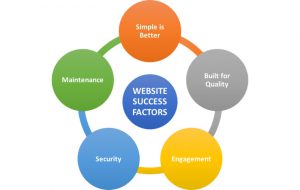Your healthcare website is the hub of your digital marketing strategy. It is the place where patients, members and influencers want to learn more about your organization. While many medical product and service companies have an online presence, they don’t think of search engine optimization (SEO) while building it or even after the site’s been developed to maintain it. A website can look great, but if it’s not built for SEO, no one will be able to find you.
Follow these 5 important factors to make your website more successful, including design and development, and what to do once the website is live.

Simple is better, especially for healthcare brands.
Before you get started with a new website, first define your goals. What do you want your visitors to see and what do you want them to do?
This all contributes to the design of your new site. Not everything can stand out. Highlight a few things that sets you apart from your competitors and make those stand out on your homepage. If visitors want more information, then they can click through the inside pages of your site to learn more.
Keep in mind, if your website is too cluttered or looks confusing, it overwhelms your visitors. They may end up leaving your site because they can’t find what they are looking for.
Also, your site should be optimized for conversions. How do you want to measure success? Make sure you have that clear call-to-action.
Built for quality.
Many people can build a website but it’s how you build it that matters. When people think of search engine optimization (SEO), they tend to think of keywords or content. However, it’s more than just that. Your website needs to be built and optimized for SEO, it needs to be built to perform on the web.
For instance, the way a website is coded can affect the load speed of your site. Load speed contributes to your SEO. The faster your site loads, the higher quality score it will get. Research shows that if your website takes 3 seconds or longer to load, your visitors won’t wait.
Your site also needs to be responsive. Whether you are viewing the site on a tablet, phone, laptop or even a TV, it needs to automatically adjust accordingly to fit each screen size.
Engagement.
How will you keep visitors engaged on your healthcare website? Make sure your content is easy to read by avoiding chunky paragraphs. Your content should be concise with captivating headlines. Share content that is compelling to visitors, such as patient testimonials, stories or exciting news. Also, incorporate photos and videos as well.
All of this is shareable content. Post on your social media accounts or send out e-newsletters to subscribers. This will also help to drive traffic back to your website.
Security.
Unfortunately, websites are prone to security risks. There is no such thing as having a website that is 100% secure. Website security is more about risk reduction than risk elimination.
The first thing you need to do to enhance the security of your website is installing an SSL Certificate. SSL Certificates are what make a website trusted. In addition, search engines typically list websites that are secure and safe first.
To make your website even more secure, you should conduct daily backups of your site. In the instance your site were to get hacked, which can happen at any time, you can revert the site to a time prior to when it was hacked – maybe a day or two or even a couple of hours. This allows for minimal loss of the site if you frequently add content.
Maintenance.
Your website will always grow. Whether you have news to share, photos to add, new testimonials or stories to promote, it’s always good to add it to your site. Google loves fresh and relevant content. It also shows Google that your website is consistently active.
Be sure to link Google Analytics and Google Search Console to your website. These are great tools to have so that you know where your visitors are coming from, how they are navigating throughout your site, and how your website is ranking on Google search results.
These are all great success factors for a very effective healthcare website. Keep in mind, if you take care of your website, it will take care of you and you will have a great return.
If you are thinking about redesigning your healthcare website or want to know how effective your site is in terms of SEO or development, contact Natalie at Springboard today for a free website audit.
